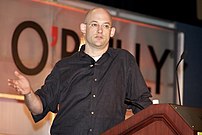 Image via Wikipedia
Image via Wikipedia
One question I’ve been asked consistently since I’ve started writing this blog for the SSP is, “How do you find the time?” In some cases, it’s said with wonder. In some cases, it’s stated with what I take as a suspicion that I also spend hours in the basement playing with dolls.
Well, a recent lecture from Clay Shirky, author of “Here Comes Everybody,” sheds some light on the transformation we’re undergoing into what Tim O’Reilly has called “the architecture of participation.” Basically, if we all stopped watching sitcoms (like our predecessors stopped drinking gin), we’d liberate enough “cognitive surplus” to write 2,000 Wikipedias per year.
Now, I haven’t watched sitcoms much lately, but I do like some shows, and probably watch about 2 hours of television a night, on average. The DVR has helped greatly. Now, I get the same amount of content in about 30 minutes less time. But whether it’s a sitcom or “The Daily Show,” it’s still time spent mostly passively absorbing information. Cutting back has not been very painful. (In the U.S., we spend about 100 million hours every weekend just watching ads.)
An interesting analysis from O’Reilly shows how much time people spend watching TV by country, and how this compares to time spent in “virtual worlds.” While some people despair about the time others spend online, they should be in agony over the amount of time people spend passively watching TV.
If only people would shut off their TVs, we’d liberate scads of useful, productive time. As Shirky puts it:
This is something that people in the media world don’t understand. Media in the 20th century was run as a single race — consumption. How much can we produce? How much can you consume? Can we produce more and you’ll consume more? And the answer to that question has generally been yes. But media is actually a triathlon, it ‘s three different events. People like to consume, but they also like to produce, and they like to share.
It’s amazing what people can get done when there isn’t a TV dominating their time.
Blogging is just one new, productive activity. There are plenty of others.
Leverage your audience’s cognitive surplus! Leverage your own!



